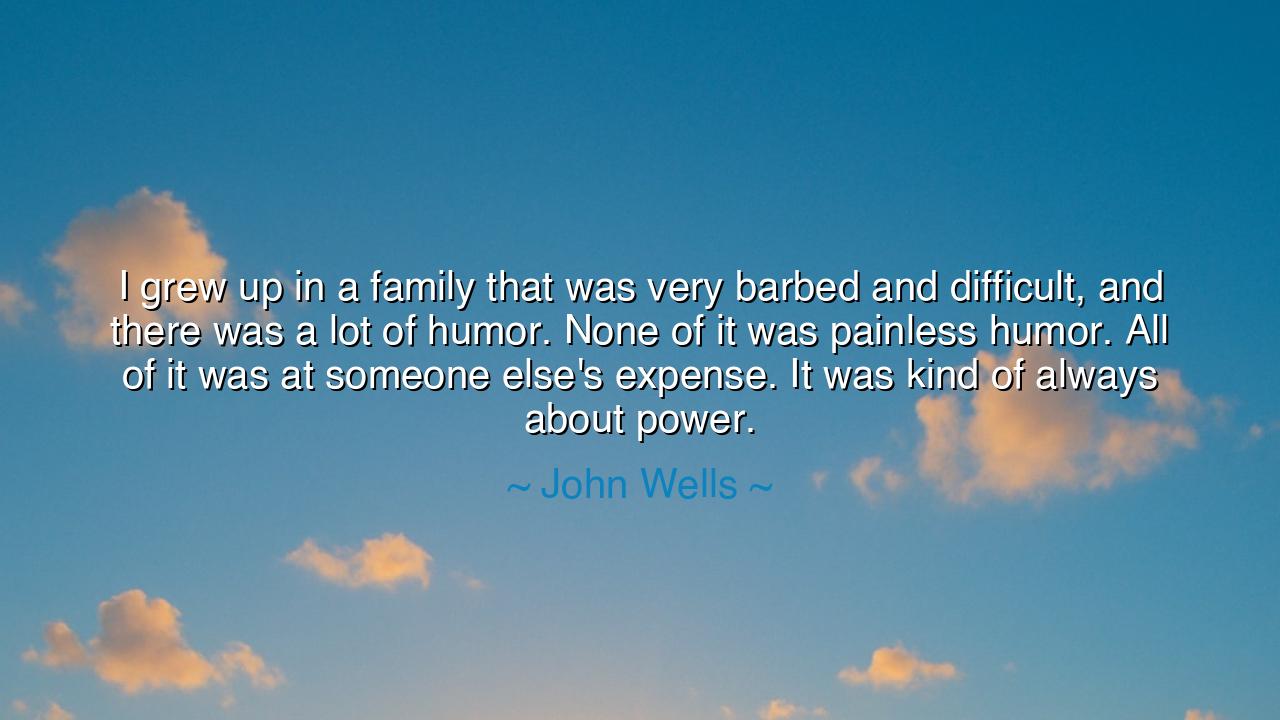
I grew up in a family that was very barbed and difficult, and
I grew up in a family that was very barbed and difficult, and there was a lot of humor. None of it was painless humor. All of it was at someone else's expense. It was kind of always about power.






When John Wells said, “I grew up in a family that was very barbed and difficult, and there was a lot of humor. None of it was painless humor. All of it was at someone else’s expense. It was kind of always about power,” he spoke not only of his own past but of a universal truth that echoes through the ages — the double-edged nature of humor. His words remind us that laughter, that most human of sounds, can both heal and wound. It can bring people together or drive them apart. For Wells, humor was forged in conflict, sharpened by pride and pain. What should have been light and freeing became a weapon — a tool of power, wielded not to comfort, but to control.
The meaning of this quote lies in the delicate balance between laughter and cruelty. Humor, in its purest form, is a balm for the spirit — a way to transform suffering into lightness. But when twisted by anger or insecurity, it becomes something else: a mask for domination, a way to lift oneself by cutting another down. Wells grew up among words that sliced rather than soothed. The “barbed humor” he describes was not the gentle teasing of affection, but the constant reminder of rank and weakness within the family’s invisible hierarchy. In such an environment, laughter was not shared; it was survived.
To understand this, we must look to history, for this struggle is as old as humanity itself. In the courts of kings, the jester was both cherished and feared. He spoke truths that others could not, cloaking them in humor. But there were times when his laughter turned cruel, when mockery became a means of reinforcing the power of the throne. The people laughed, yes — but their laughter was tinged with fear. So it is in many families, workplaces, and societies: humor can uphold truth, but it can also uphold tyranny. Wells’ family, like those ancient courts, used humor to establish dominance, to remind each person of their place in the unspoken order.
The origin of such humor often lies in pain. Those who strike first with their words are often those who fear being struck themselves. The sharp-tongued and the mocking learn early that laughter can be armor — that if they make others the target, they will not become one. But this is a hollow protection. As Wells implies, power gained through such laughter isolates the heart. The home that should be a sanctuary of warmth becomes an arena of wit and wounding. Each quip, each cutting remark, becomes a small battle in a war for validation. Over time, the wounds left by such humor are not easily seen, yet they shape lives as surely as blows.
And yet, the same fire that burns can also illuminate. In acknowledging this truth, Wells transforms his pain into wisdom. He recognizes that laughter, when used rightly, holds immense redemptive power. For in humor lies the ability to expose what is false, to humble the mighty, and to comfort the broken. But only when it is wielded with empathy, not ego. “Painless humor,” as Wells calls it, is not weakness; it is the mark of maturity — the laughter that uplifts rather than destroys, that sees our shared foolishness and forgives it.
Consider the story of Abraham Lincoln, who, in the darkest days of the Civil War, used humor not to belittle, but to unite. His jokes were often self-deprecating, gentle, and wise. When others criticized him, he laughed at himself first, diffusing anger and reminding his audience of their shared humanity. In this way, humor became his tool not of power, but of peace. Unlike the barbed humor of Wells’ youth, Lincoln’s laughter was an act of grace — a form of leadership through humility.
From this, we learn a sacred lesson: humor reveals the heart’s intention. If it is born of fear, it divides. If it is born of love, it heals. Therefore, let your laughter be mindful. Ask yourself, when you speak in jest: does my humor build others up, or tear them down? Do I use it to connect, or to control? The ancients taught that words are arrows once released — they cannot be called back. So let your humor be the kind that lights a fire for warmth, not for war.
In the end, John Wells’ reflection is a reminder that even in pain there is insight, and even in brokenness there is the seed of transformation. He teaches us that power without kindness corrupts laughter itself, turning it into noise. But laughter guided by compassion becomes holy — a song of survival, a bond between souls. Let your humor be gentle, let your words be light, and let your power come not from making others small, but from helping them stand tall beside you. For laughter shared in kindness is the purest proof that the human spirit endures — undefeated, and still capable of joy.






AAdministratorAdministrator
Welcome, honored guests. Please leave a comment, we will respond soon